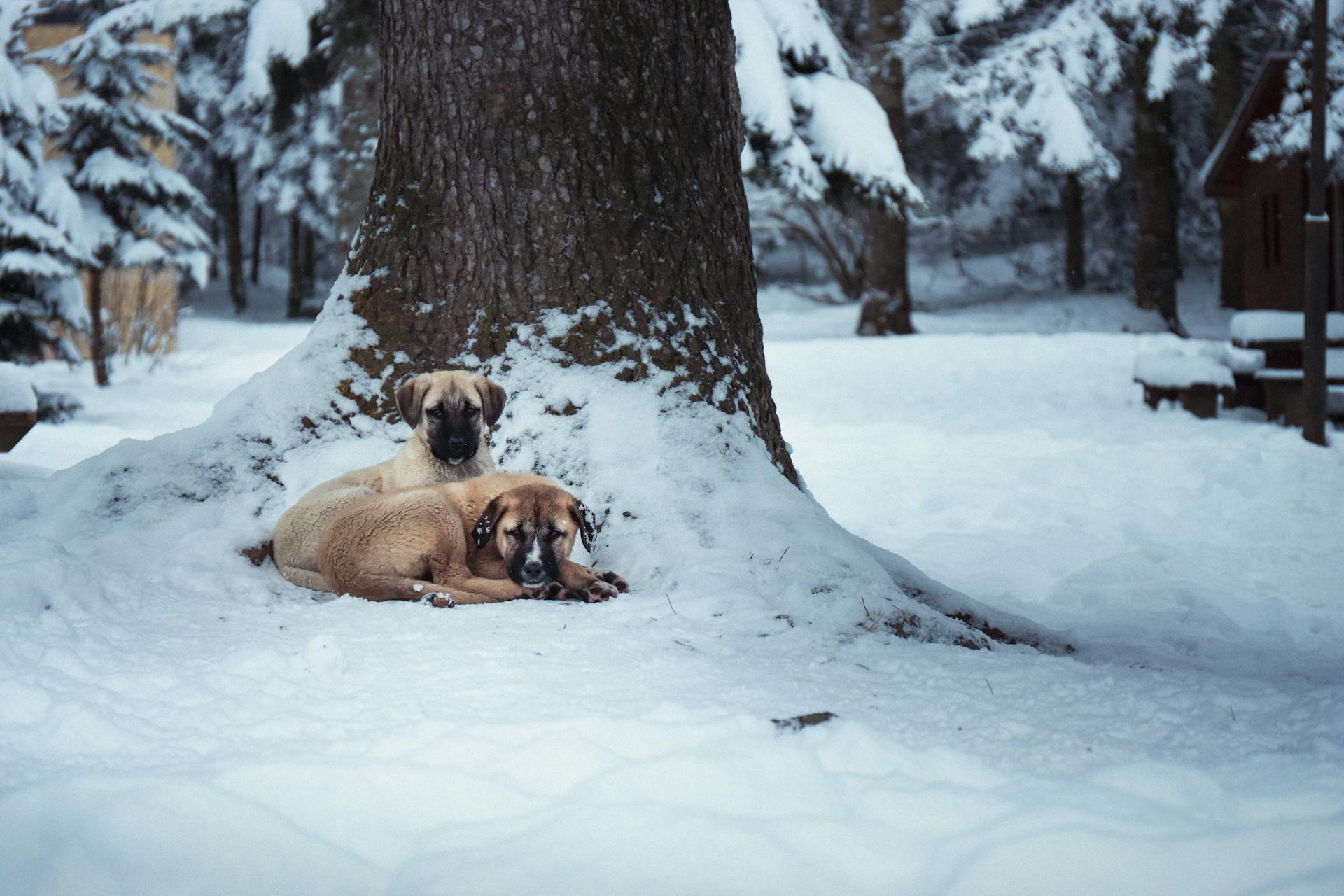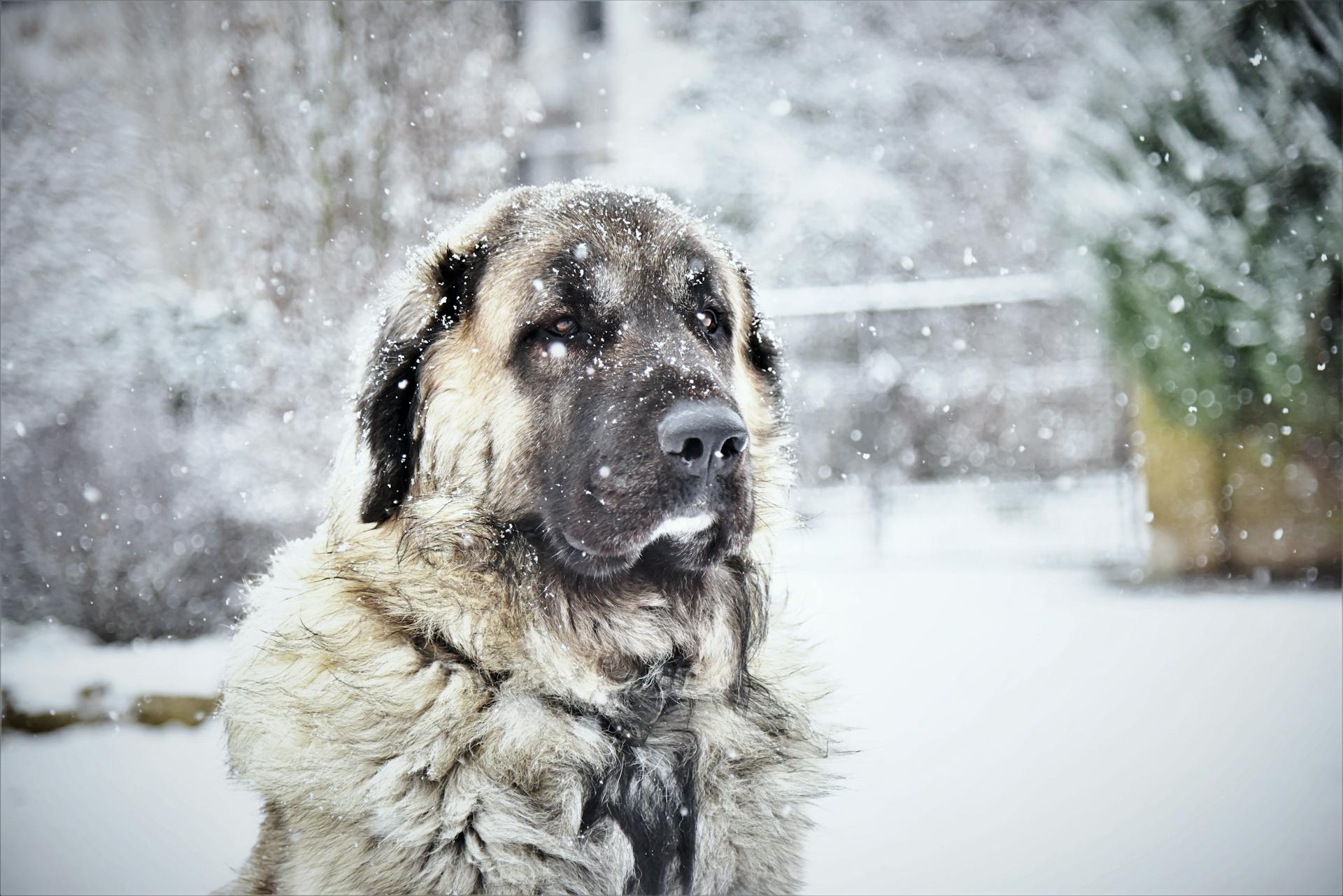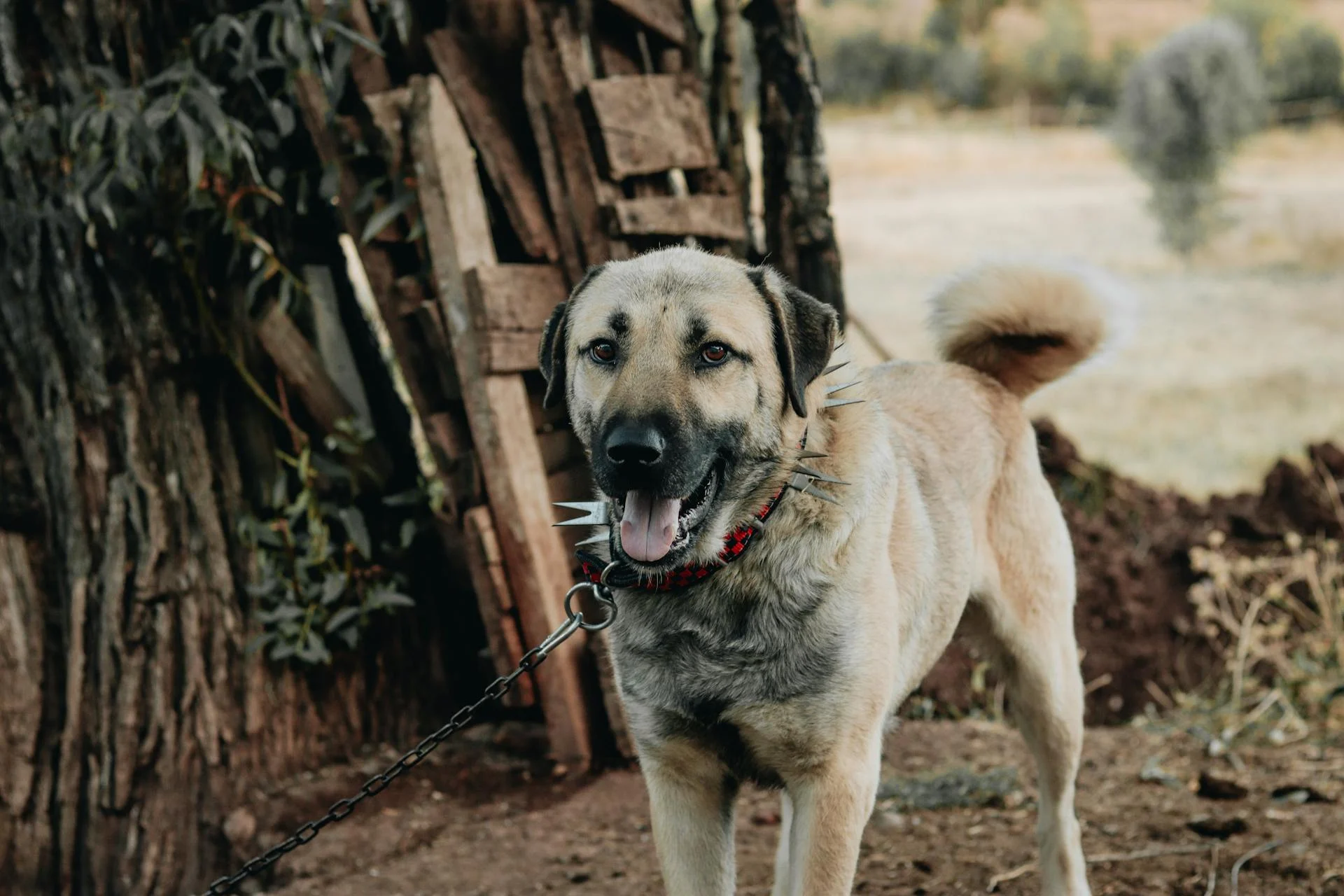
The Giant Turkish Kangal Dog is a majestic breed that originated in Turkey, specifically bred to guard livestock and protect property.
This breed is known for its intelligence, loyalty, and protective nature, making them a popular choice for farmers and families alike.
The Giant Turkish Kangal Dog typically weighs between 110-145 pounds and stands between 30-32 inches tall at the shoulder.
They are a relatively healthy breed, but like all breeds, they can be prone to certain health issues, such as hip dysplasia and eye problems.
Behavior and Temperament
The Turkish Kangal Dog's temperament is a unique blend of protection and gentleness. They are bred to guard flocks of sheep from wolves, making them formidable guard dogs.
They form a tight bond with their family, including other pets, but are always suspicious of strangers on their territory. Asserting yourself in training is crucial to establish your dominance.
These dogs are intelligent and highly trainable, but they require a specific approach. Traditional training methods won't work, as they develop independence from a young age, around 2 years old.
To train a Kangal, you need to supervise their natural instincts and reward positive behavior. Discouraging negative behavior like biting and chewing in puppies is essential to prevent problems later on.
The Kangal's guarding abilities are innate, but they can be controlled with proper training. With socialization from an early age, they can develop into well-behaved and well-rounded dogs.
Their intelligence and strength make them one of the best guard dogs, but they also have a gentle side. They are loving, tolerant, calm, and protective, making them great family pets.
The Kangal's bite force is the strongest in the dog world, with a force of 743 psi. Only the Rottweiler comes close, with a bite force of 328 psi.
Expand your knowledge: Turkish Kangal Dog Bite Force
Health and Care
Kangal dogs are generally healthy and long-living, with an average lifespan of 12 to 15 years. This is quite impressive for a dog of their size.
They are prone to a few health conditions, including hip dysplasia, which is a common bone defect in large breeds that affects the normal movement of the animal. Hip dysplasia occurs when the hip joint doesn't fit properly with the hind leg, causing discomfort.
For your interest: Hip Dysplasia Bernese Mountain Dog
Lipomas and benign tumors are also common in Kangal dogs, appearing as harmless lumps on the skin that can grow into large lumps if left untreated. They can interfere with the dog's normal movements.
Entropion is a hereditary condition where the eyelid folds inwards and into the eye, causing irritation and symptoms such as excessive tearing, keeping the eye shut, and squinting.
To ensure you're getting a healthy puppy, ask the breeder for the parent dog's health certificates. It's also essential to find a reputable breeder with expertise in breeding working dogs.
Here are some essential health and care needs to consider:
In terms of grooming, Kangal dogs have short and dense coats that are generally easy to groom. They require 5 minutes of combing every week, but unlike other breeds, they don't need teeth brushing.
Health Problems
The Turkish Kangal Dog is generally a healthy breed, but like all breeds, they can be prone to certain health issues.

Canine hip dysplasia is a common problem in large breeds like the Kangal, which can cause discomfort and affect the dog's movement.
Hip dysplasia is a congenital condition that affects the hip joint, causing it to not fit properly with the hind leg.
Elbow dysplasia is another issue that can affect the Kangal, although it's not as commonly mentioned as hip dysplasia.
Lipomas and benign tumors are also a concern for Kangal owners, as they can appear on the skin and grow into large lumps if left untreated.
Entropion, a hereditary condition where the eyelid folds inwards, can cause irritation and discomfort for the dog.
If you're considering bringing a Kangal puppy into your family, it's essential to ask the breeder for the parent dog's health certificates.
Here are some common health concerns in Kangal Shepherd Dogs:
Grooming and Dietary Needs
Grooming a Kangal dog is a breeze, thanks to their short and dense coats. They only need a de-shedding tool and metal comb to keep their hair looking its best.
You'll need to commit to 5 minutes of combing every week to prevent matting and tangling.
Their short coats also mean they don't require regular teeth brushing. Instead, dental health can be managed through diet and dental chews.
A fully grown Kangal dog needs a whopping 6 to 7 cups of high-quality dry dog food per day. That's a lot of kibble!
Some great dog food brands for a Kangal dog include Eukanuba, Hill's Science Diet, Croquettes Royal Canin, and Purina Pro Plan.
Here are some recommended dog food brands for your Kangal canine:
- Eukanuba Adult Maintenance Dog Food
- Hill’s Science Diet Dry Dog Food Healthy Mobility
- Croquettes Royal Canin
- Purina Pro Plan
Make sure to choose a food that's specially formulated for large breeds to ensure your Kangal gets the nutrients they need.
Training and Living Conditions
Training a Kangal dog requires patience and a tactical approach, as they don't respond well to obedience training and basic commands.
They're driven by instinct and can be headstrong, so a firm and gentle handler with experience is necessary.
A large fenced backyard is a must for a Kangal, where they can run and play to exhaust their excessive energy.
They need long daily walks and make great jogging and running partners for active owners.
Their training sessions should be short, fun, and use positive reinforcement, with a dog whistle being an effective tool.
They may not always obey commands, not because they can't understand, but because they simply don't want to.
Allowing them suitable freedom, encouraging positive behavior, and discouraging negative behavior is the best way to train a Kangal.
Apartment life is not suitable for a Kangal, as they require too much space and exercise.
A different take: Giant Dog Breeds That Dont Shed
Safety and Security
A Kangal dog is a natural guardian, and their protective instincts are triggered by their sense of loyalty and territoriality. They will not attack an intruder on sight, but will first try to alert them with a loud roar and bark.
Their primary concern is the safety of their property, flock, and family. If the intruder doesn't leave after being alerted, the Kangal will take action to defend what's important to them.
Recommended read: When Will Shiba Inu Hit 1 Cent
Kangal dogs are naturally wary of strangers and will keep a close eye on anyone approaching their territory. This instinctual behavior helps them detect potential threats and respond accordingly.
In a situation where an intruder refuses to leave, a Kangal dog will not hesitate to attack to protect their loved ones.
Recommended read: Will Shiba Inu Coin Reach .01
Legality and Strength
In the US, Kangal dogs are legal, but laws vary from state to state, and the Turkish government's ban on exporting them makes finding a puppy challenging.
A single Kangal puppy can cost anywhere from $2,000 to $4,000, which is a significant investment.
These dogs are among the strongest in the world, boasting a bite force of 743 psi, which speaks volumes about their strength.
Is the Strongest?
The Kangal's strength is quite impressive. Their bite force is 743 psi, which is a significant indicator of their power.
These dogs are capable of killing a wolf and other deadly predators, thanks to their strong bite force. This is evident in their ability to take down intruders without needing to attack.
On a similar theme: Dog Bite

Their slow attack speed may seem like a weakness, but it's actually a strategic advantage. Their powerful sight is often enough to ward off threats, making them a formidable guardian.
Overall, the Kangal's strength is undeniable. Based on their bite force, it's safe to say they're among the strongest dogs in the world.
Legal in US?
Kangal dogs are legal in the US, but the laws may differ from state to state.
The Turkish government has imposed a ban on the export of these dogs, making it hard to find a legally sound Kangal puppy.
Finding one could be extremely costly, with prices ranging from $2,000 to $4,000 for a single puppy.
Sources
- https://www.dogbreedslist.info/all-dog-breeds/kangal-dog.html
- https://www.omlet.us/breeds/dogs/turkish_kangal_dog/
- https://www.dogbreedinfo.com/kangaldog.htm
- https://www.realesaletter.com/blog/dog-breeds/kangal-shepherd-dog
- https://medium.com/@omer.u.ozer/why-kangals-are-the-best-dogs-and-why-you-should-not-get-one-fd941e1f0500
Featured Images: pexels.com


